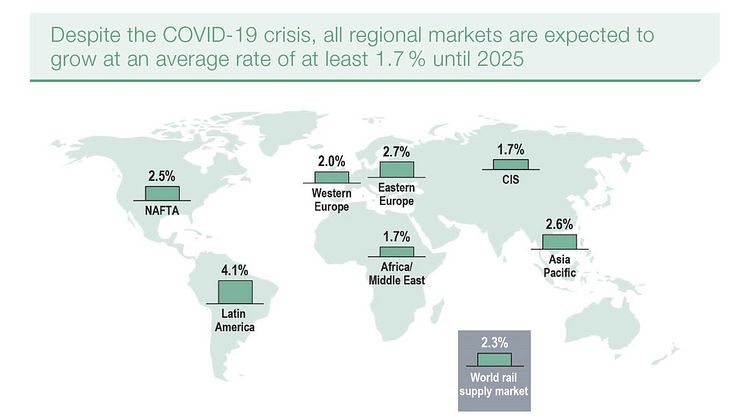
Press release -
Global rail market grows despite COVID-19
- World market for rail technology reaches a new record high of EUR 177 billion in 2019
- COVID-19 pandemic leads to losses in 2020 (-8%) but stable growth is expected again by 2025
- Trade restrictions and lack of market access pose risks to European suppliers
Brussels/Munich, October 2020: The global market for rail technology has survived the COVID-19 pandemic relatively unscathed and will emerge from the crisis stronger in the medium term – despite an 8% slump in 2020. This is the assessment of the "World Rail Market Study: Forecast 2020 to 2025", which Roland Berger conducted on behalf of UNIFE, the Association of the European Rail Supply Industry.
"The rail transport market has been hit by the pandemic, which has temporarily interrupted the strong growth that we were experiencing. Nevertheless, after a challenging 2020 we are confident that the various stimulus plans together with the increasing demand for sustainable mobility solutions will lead to a solid market recovery, translating into a 2.3% compound annual growth rate between the periods 2017-19 and 2023-2025," said Henri Poupart-Lafarge, Chairman of UNIFE, and Chairman and CEO of Alstom.

Record volume of EUR 177 billion
A record market volume of EUR 177 billion was reached at the end of 2019, proving the appeal of rail transport in all of its forms, ranging from urban metro to commercial freight. The sector has grown by 3.6% annually since 2017. The strongest driver was the rolling stock segment (up 6.8%), followed by rail control solutions (up 4.1%) and the infrastructure market (up 2.3%). By comparison, growth in the services market was rather moderate at 0.9%.
The "installed base" (i.e. the number of vehicles in operation and the existing route network) has also seen steady growth. Since the last assessment (2018), the global rail network has been extended by 23,300 kilometers and the number of vehicles has increased by 20,000 units.
Looking at the global distribution of growth, it becomes clear that, "the Asia-Pacific region and Western Europe made the largest contribution to the positive development of the entire market with 5.3% and 3.8% respectively," as Andreas Schwilling, Partner at Roland Berger, explained. Compared to the last study, only the Africa/Middle East market showed a slight decline (-1.2%), while all other markets grew.
Positive medium-term outlook
The experts estimate that the market will develop positively in the medium and long term, with an average annual growth rate of 2.3% until 2025 despite an 8% decline in 2020 caused by the COVID-19 crisis. The total market volume is expected to reach EUR 204 billion by 2025. This assumption is based on a rapid recovery of the market, which the authors consider probable under the so-called V-case scenario.
Different global developments are likely to continue to fuel rail market growth in the future. "Megatrends such as urbanization, global population growth and growing environmental awareness will lead to higher passenger numbers, while digitalization and automation will make the rail sector more attractive," said Andreas Schwilling. He added that the increasing environmental awareness shown by political programs such as the European Green Deal, the planned shift of traffic to railways and the inevitable expansion of public transport in major cities would also guarantee the positive development of rail. However, public funding will need to be ensured and sustained to achieve that progress.
International trade barriers as a threat to growth
International trade barriers, such as shrinking accessibility in Asian markets, have developed into serious impediments to rail sector growth, the study warns.
As a result, the share of the world market for railroad technology that remains accessible to European companies has shrunk slightly from 63% to 62% since the 2018 study. A market volume of EUR 67.1 billion remains unattainable for European companies and this could be worsened by the current economic downturn.
"The market should be equally open to all rail suppliers, whether domestic or foreign," stated Philippe Citroën, Director General of UNIFE. "A level playing field is crucial for efficient rail systems, and we call on institutions to ensure that competition is fair as a means of preventing any further decline in market accessibility."
Topics
Categories
Roland Berger, founded in 1967, is the only leading global consultancy of German heritage and European origin. With 2,400 employees working from 35 countries, we have successful operations in all major international markets. Our 52 offices are located in the key global business hubs. The consultancy is an independent partnership owned exclusively by 250 Partners.




